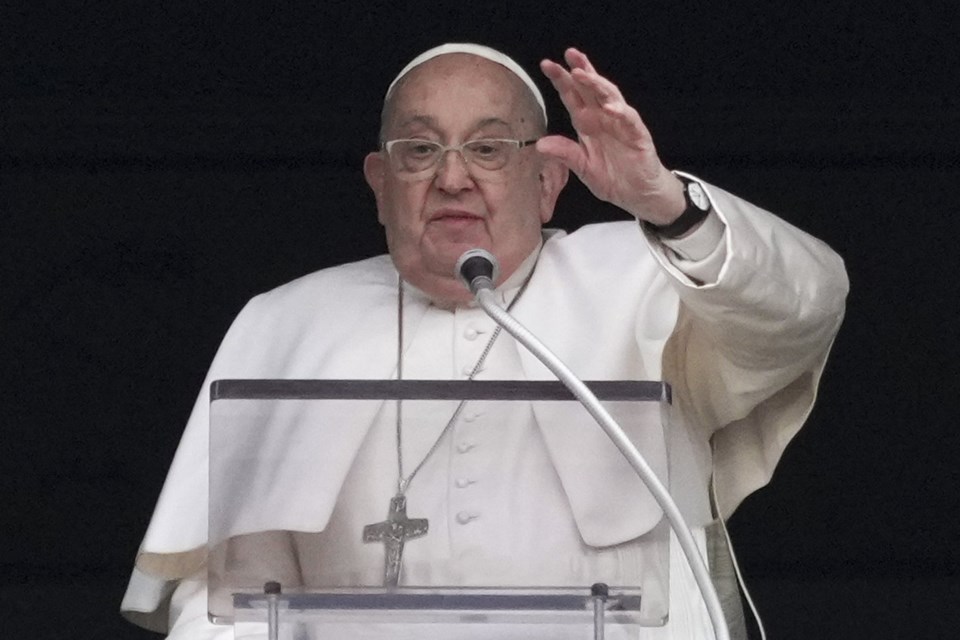VATICAN CITY (AP) — Some takeaways about the life of Pope Francis, who died Monday:
Background
Jorge Mario Bergoglio was born Dec. 17, 1936, to Italian immigrants in Buenos Aires, Argentina, the eldest of five children. He was ordained a Jesuit priest in 1969 and led the religious order in Argentina during the country’s murderous dictatorship from 1976-83. He became archbishop of Buenos Aires in 1998 and elevated to cardinal in 2001 by St. John Paul II. He was elected the 266th pope on March 13, 2013, on the fifth ballot.
Francis' Firsts
— The first pope from the Americas.
— The first from the Jesuit order to be elected pope.
— The first to take the name of Francis, after St. Francis of Assisi.
— The first to visit Iraq, meeting its top Shiite Muslim cleric in 2021.
Humility and simplicity
As Buenos Aires archbishop, Francis denied himself the luxuries his predecessors enjoyed, riding the bus, cooking his own meals and regularly visiting slums. This simplicity continued as pope, marked by Francis taking the name of the 13th century saint known for personal simplicity. He lived in the Vatican hotel instead of the Apostolic Palace, wore his old orthotic shoes and not the red loafers of the papacy, and set an example to the clerical classes by using compact cars.
Migrants
Advocating for migrants was one of Francis' priorities as pope. His' first trip outside Rome in 2013 was to the Sicilian island of Lampedusa to meet with newly arrived migrants. He denounced the “globalization of indifference” shown to would-be refugees. He prayed for dead migrants at the U.S.-Mexico border in 2016 and brought 12 Syrian Muslims to Rome on his plane after visiting a refugee camp in Lesbos, Greece. His plea for welcome put him at odds with U.S. and European policies. He said in 2016 of then-candidate Donald Trump that anyone building a wall to keep migrants out “is not a Christian.”
LGBTQ+ stance
Early in his papacy, Francis signaled a more welcoming stance toward LGBTQ+ people, declaring “Who am I to judge?” when asked about a gay priest. In a 2023 Associated Press interview, he declared that, “Being homosexual is not a crime,” and later approved blessings for same-sex couples, provided they don’t resemble marriage vows.
Environmental stance
Francis became the first pope to use scientific data in a major teaching document and made care for God’s creation a hallmark of his papacy. In 2015, his environmental manifesto “Praised Be,” urged a cultural revolution to correct what he called the “structurally perverse” global economic system that exploits the poor and turned Earth into “an immense pile of filth.” Many popes before him, though, also called for better care for the environment.
Clergy sexual abuse stance
The greatest scandal of his papacy came in 2018, when he discredited Chilean victims of clergy sexual abuse by siding with a bishop whom they accused of complicity in their abuse. Realizing his error, he invited them to the Vatican and apologized in person. He also brought the entire Chilean bishops conference to Rome, where he pressed them to resign. He convened a summit of the Catholic hierarchy in 2019 on abuse and sent a strong signal by defrocking former U.S. Cardinal Theodore McCarrick after a Vatican investigation determined he abused minors as well as adults. Francis passed church laws abolishing the use of pontifical secrecy and establishing procedures to investigate bishops who abuse or cover up for predator priests. But he was dogged by high-profile cases where he seemed to side with accused clergy.
His critics
In his first years as pope, critics had a living alternative in Pope Benedict XVI, who had resigned and was living on the Vatican grounds. That amplified the right-wing opposition to Francis' reform agenda. Some called him a heretic after he opened the way in 2016 to letting divorced and civilly remarried Catholics receive Communion. In 2018, the Vatican’s retired U.S. ambassador Archbishop Carlo Maria Vigano published an accusation that U.S. and Vatican officials for two decades covered up McCarrick’s sexual misconduct and demanded that Francis resign. After Vigano amplified his criticisms and drew a following of his own, the Vatican in 2024 excommunicated him for schism.
The Associated Press



